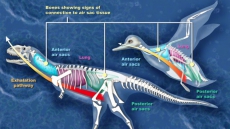Sunscreens give protection to the human skin from ultraviolet (UV) radiation and are almost a necessity among the beach goers - but at the cost to the environment.
When some sunblock ingredients wash off the skin into the sea, they can become toxic to some of the ocean's tiniest inhabitants, which are the main food for many marine animals.
Spanish researchers Antonio Tovar-Sanchez and David Sanchez-Quiles found that titanium dioxide and zinc oxide nanoparticles which are common ingredients in sunscreen, can react with UV light from the sun and form toxic compounds such as hydrogen peroxide.
High amounts of hydrogen peroxide harm phytoplankton - the microscopic algae that feed marine animals from small fish to shrimp to whales.
During the study, scientists tested the waters at Palmira beach, Majorca on the Mediterranean coast.
The lab tests, seawater sampling and tourism data found that titanium dioxide from sunblock was responsible for a dramatic spike in hydrogen peroxide levels in coastal waters - and dangerous consequences for aquatic life.
The study appeared in the journal Environmental Science & Technology.





